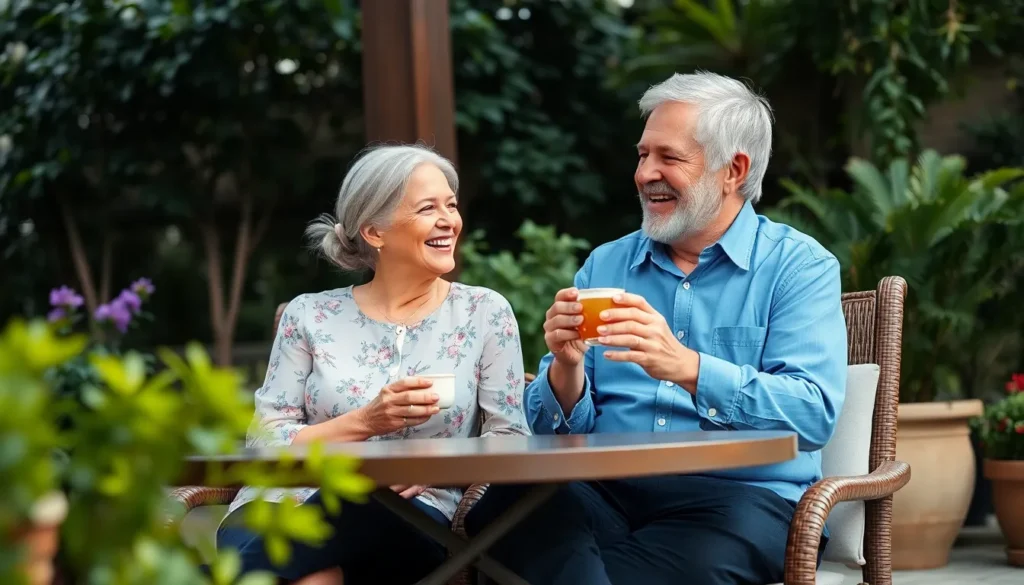Table of Contents
ToggleAs the world shifts towards simplicity and intentional living, minimalist retirement emerges as a compelling choice for many. It’s not just about downsizing possessions; it’s about redefining what it means to live well in retirement. By embracing a minimalist lifestyle, retirees can focus on experiences rather than material wealth, leading to a more fulfilling and financially sustainable future.
This approach encourages individuals to prioritize their time and resources, allowing them to enjoy life’s simple pleasures. With careful planning and a clear vision, a minimalist retirement can offer freedom from the burdens of excess, enabling a more meaningful and enriched life. Whether it’s traveling light or cultivating deeper connections, the minimalist path opens doors to new adventures in the golden years.
What Is Minimalist Retirement?
Minimalist retirement focuses on lifestyle simplicity, emphasizing intentional living and meaningful experiences. This approach encourages individuals to declutter their lives, not just in terms of physical possessions but also in commitments and distractions. Embracing minimalism means prioritizing quality over quantity, fostering a fulfilling retirement centered on joy and connection rather than material wealth.
By opting for minimalist retirement, retirees redefine happiness through personal experiences, relationships, and adventures. This lifestyle often entails downsizing homes, reducing expenses, and spending more time on activities that bring genuine delight. Individuals often find greater peace of mind and financial sustainability, as a minimalist approach can lead to lower living costs and fewer financial burdens.
In practicing minimalist retirement, individuals can engage in mindful spending and intentional planning. They may choose to travel, volunteer, or take up new hobbies, enriching their lives while maintaining a focus on what truly matters. By emphasizing simplicity and purpose, minimalist retirement offers a deeper sense of satisfaction in the later years of life.
Benefits of Minimalist Retirement

Minimalist retirement offers several compelling benefits, with financial freedom and simplicity being key aspects. Embracing a minimalist approach in retirement creates a more fulfilling and intentional lifestyle.
Financial Freedom
Financial freedom emerges as a significant advantage of minimalist retirement. By reducing expenses related to excessive possessions and commitments, retirees can lower their overall cost of living. For instance, simple living often includes downsizing to smaller homes or renting, which leads to lower utility costs and maintenance expenses. According to a 2020 study by the Bureau of Labor Statistics, households that adopted minimalist lifestyles reported saving up to 30% on monthly spending. Without the financial burdens of materialism, retirees can allocate resources toward experiences like travel or hobbies, fostering a richer life.
Simplicity and Clarity
Simplicity and clarity significantly enhance the quality of life during retirement. A minimalist approach encourages individuals to declutter not just their physical spaces but also their mental and emotional environments. Prioritizing essential activities allows retirees to focus on meaningful relationships and fulfilling experiences. This intentional choice often leads to reduced stress levels, as fewer distractions promote a clearer mindset. Studies from the American Psychological Association highlight that individuals practicing minimalism report higher life satisfaction due to the prioritization of values over possessions. Retirees embracing this clarity can engage more deeply in daily activities, resulting in a more vibrant and enriching retirement experience.
Key Principles of Minimalist Retirement
Minimalist retirement centers on simplicity and purpose. A focus on decluttering and streamlining leads to a more rewarding retirement lifestyle.
Decluttering Your Life
Decluttering one’s life involves removing unnecessary possessions and commitments. Individuals can start by evaluating their belongings, keeping only items that provide value or joy. For example, implementing the “one in, one out” rule can help prevent future accumulation. Additionally, decluttering commitments involves reassessing time spent on obligations, favoring activities that enrich life over those that drain energy. Prioritizing experiences fosters connection with others and creates deeper fulfillment. This lifestyle shift encourages retirees to embrace what truly matters, leading to a vibrant and uncluttered existence.
Simplifying Finances
Simplifying finances plays a crucial role in achieving minimalist retirement. Individuals can create a budget that emphasizes essential expenses while eliminating unnecessary expenditures. For instance, tracking monthly spending reveals opportunities for reduction, such as downgrading to a smaller living space. Research indicates that retirees adopting minimalist financial practices can save significant amounts annually. Establishing a streamlined financial plan allows for better management of resources, enabling retirees to allocate funds for meaningful experiences. Overall, simplifying finances contributes significantly to reducing stress and enhancing overall well-being in retirement.
How to Implement Minimalist Retirement
Implementing minimalist retirement involves thoughtful planning and intentional actions. The following strategies guide individuals in crafting a fulfilling, minimalist lifestyle.
Creating a Retirement Plan
Creating a retirement plan requires identifying priorities and establishing clear financial goals. Start by assessing essential expenses and sources of income. Research shows that retirees with planned budgets save an average of 20% on unnecessary expenditures. Outline a budget that factors in housing, healthcare, and leisure activities while reducing discretionary spending. Involve family members in discussions to ensure alignment on lifestyle preferences and expectations. Regularly review and adjust the plan based on changing circumstances or priorities.
Downsizing Your Home
Downsizing your home plays a critical role in minimalist retirement. Evaluate the current living space to determine if it aligns with minimalist values. Consider moving to smaller homes, which can cut down utility and maintenance costs by approximately 30%. Use the “one in, one out” principle to minimize possessions before the move. This rule facilitates the conscious decision of keeping only valuable items. Donate or sell items no longer needed to lighten the load and simplify the transition process. Moreover, relocating to closer proximity to essential services can enhance convenience and reduce the need for transportation, further supporting a minimalist lifestyle.
Embracing a minimalist retirement offers a transformative path toward a fulfilling and intentional life. By prioritizing experiences over material possessions, retirees can cultivate deeper relationships and engage in meaningful activities. This lifestyle not only reduces financial burdens but also enhances overall well-being, allowing individuals to focus on what truly matters.
The journey to minimalist retirement involves thoughtful planning and conscious decision-making. With careful consideration of priorities and a commitment to simplicity, retirees can create a vibrant and enriching retirement experience. Ultimately, this approach fosters a sense of freedom and peace of mind, enabling individuals to enjoy life’s simple pleasures and embark on new adventures.




